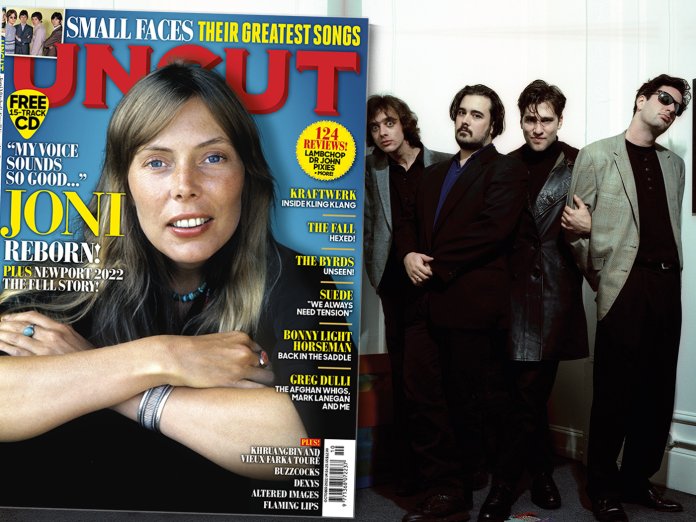In the latest issue of Uncut magazine – in UK shops now and available to buy from our online store, Sharon O’Connell talks to Greg Dulli about his amazing musical journey.
Greg Dulli is the driving force of The Afghan Whigs, whose early debt to Hüsker Dü was displaced by a love of ’60s soul and R&B that marked them out from the grunge pack. Having survived both a breakup and lengthy hiatus, as well as the death of guitarist Dave Rosser, the Whigs remain Dulli’s highest profile – and most successful – band, with nine albums to their credit (including How Do You Burn?, due in September), but it’s by no means his only project of substance. During their tussle with Elektra, Dulli formed The Twilight Singers, a changeable group of simpático players and friends.
They racked up five studio albums, none of which pulled their leader’s focus away from emotional turmoil and existential angst. There was a different working relationship, if no less intense songs, in play with Dulli/Lanegan vehicle The Gutter Twins, who released just one album, but Dulli busted out of type with his surprise solo debut, Random Desire, an adventurous set whose liberating effect seems to have been carried forward to the new Whigs record. Through all this, Dulli’s prime motivation for recording remains the same: “Will I have a good time? Is this fulfilling? Do I want to take these songs out and play them for other people? It’s really that simple”.
THE AFGHAN WHIGS
CONGREGATION
SUB POP, 1992
The Whigs’ third, its debt to ’60s soul, funk and R&B carving out a singular alt.rock profile
I would call it not only our breakthrough to a bigger public, but also a breakthrough for us as a group; I feel like that’s when we became The Afghan Whigs. That’s when we put it all together – all of the promise and all of the gigs and influences and I think my songwriting caught up to my ambitions. [We felt] a fearlessness to just do what we wanted – not be afraid to play slow songs, for example. We were sort of guided a little bit by the label on Up In It [Sub Pop, 1990] and I feel we broke through and just stated our independence within the structure of the label with this record.
I think Congregation was where I first started to experiment with cinematic structure – the person’s voice who opens Congregation is the person who gets sung about in the next album, Gentlemen. I think [the songs’ complexity] came from the interplay of the gigs we got to play, on a nightly basis. A lot of touring happened after Up In It; we were able to tour Europe and play England for the first time. You start to hone your best instincts and then you start to trust them. And that’s when you become special. I think the recording budget [$15,000] was looked at as extravagant. It certainly was extravagant compared to what we got before that! But I felt like we had earned our place and were worth the investment. And clearly, the investment paid off.
THE AFGHAN WHIGS
GENTLEMEN
ELEKTRA, 1993
Recorded in Memphis, the Whigs’ fourth tells of a toxic relationship via intense songs full of swagger, shame and self-loathing
We wrote it on the road – back-to-back records: Congregation ’92, Gentlemen ’93. That’s something that really doesn’t happen any more. We sort of went non-stop: there was an EP between Up In It and Congregation, so with “Uptown Avondale” we had five releases in a row – bang, bang, bang, bang, bang. It was a very prolific period for the group.
When I look back on Gentlemen I see someone trying to figure out relationships, and I think that’s why on side two I gave the big song [“My Curse”] to Marcy [Mays]. There’s no-one like her and we’ve been friends since the late ’80s. That was giving the subject a voice, which also allowed me to call in my own responsibility for the demise of the relationship. And I was able to look at the grey in between the two poles. “Ladies, let me tell you about myself/I got a dick for a brain” was the opening line of “Be Sweet”: clearly, I realised that would get bold faced, so to speak. So much so that I haven’t played that song since that tour. Which is not to say that I don’t think it’s a good song, because I do.
I think the album, Gentlemen, just got hard to sing for a little while. During the Twilight Singers run, I was able to not play those songs and then, when we reunited in 2012, I actually came to a sense of peace about it all. But I still didn’t sing “Be Sweet”. So for whatever reason, that song never got sung again. “I Keep Coming Back” is the flip side to “Turn Back The Hands Of Time”, by Tyrone Davis. I listened to it almost every night. It became like a ritual for me; I became really fixated on that song and the simple message that it was from one person to another.
I remember introducing it to the group at the last minute and we all swapped instruments, so everybody is playing a different instrument on that. It seemed like a good way to end it and then we turned it into a strange instrumental at the end, which gave it the cinematic closing.
PICK UP THE NEW UNCUT FOR THE FULL STORY



